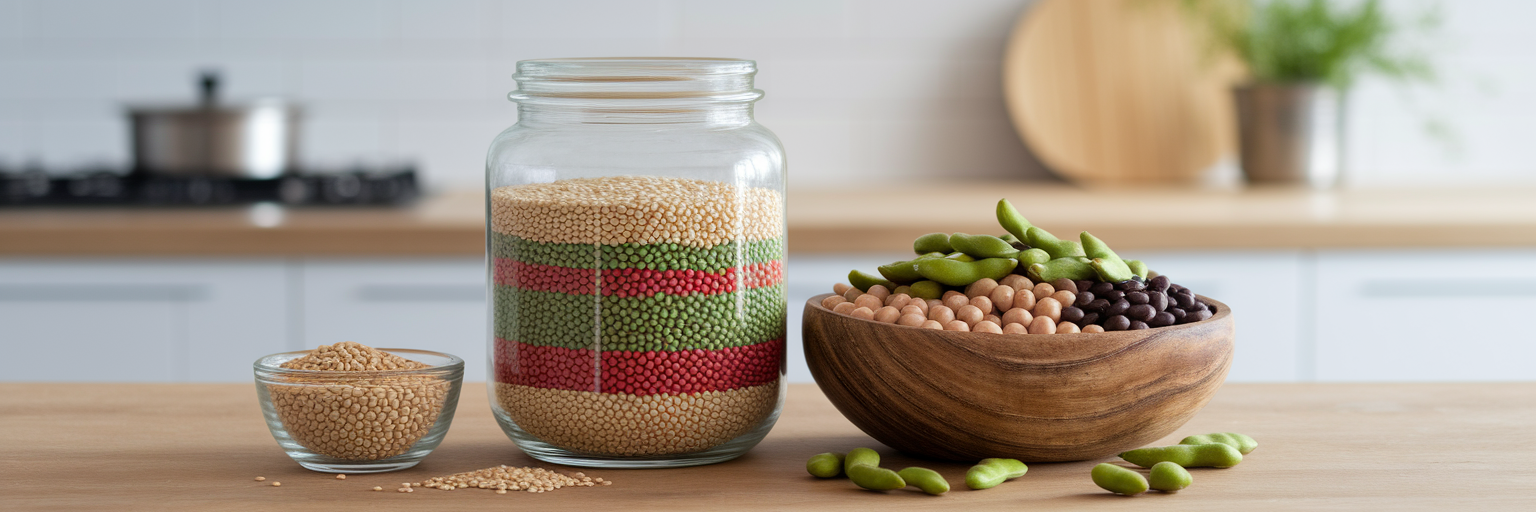When you decide to lose weight, you’re probably focused on the number on the scale. But did you know that during a typical diet, a significant portion of the weight you lose can be muscle? This is a problem because less muscle means a slower metabolism, making it harder to keep the weight off. This is where protein becomes the hero of your fat loss story, and a plant-based approach can be incredibly effective for vegan protein for weight loss.
The Vital Role of Protein in Your Fat Loss Journey
Think of protein as the bodyguard for your muscles. When you're in a calorie deficit to lose fat, your body looks for energy sources. Without enough protein, it can start breaking down precious muscle tissue for fuel. Supplying your body with adequate protein sends a clear signal: burn the fat, but leave the muscle alone. This is the foundation of understanding how to preserve muscle on a vegan diet while leaning out.
Protein also helps you feel full and satisfied. We’ve all been there, feeling hungry an hour after eating a carb-heavy meal. Protein-rich foods digest more slowly, which helps keep hunger at bay and reduces the chances of reaching for unplanned snacks. This natural appetite control makes sticking to your plan feel less like a battle.
Finally, protein has a powerful effect on your metabolism through something called the Thermic Effect of Food (TEF). Your body actually uses energy to digest and process the food you eat. Protein requires your body’s internal furnace to work harder than it does for fats or carbs, meaning you burn more calories just by digesting it. In fact, a clinical trial highlighted by Italy's National Research Council found that a low-fat vegan diet increased post-meal calorie burn, showing just how effective plant-based eating can be for metabolism.
Plant-Based Protein Versus Animal-Based Protein

A common question we hear is whether plant proteins can really compete with animal-based options like whey. The answer is a confident yes. When planned correctly, plant-based proteins are just as effective for building and preserving muscle during fat loss. The conversation around plant protein vs whey for fat loss is less about which is "better" and more about which is right for you.
You may have heard the term "incomplete protein" used to describe plant sources. This simply means that a single plant source might be low in one or two essential amino acids. But your body is smart. It can pool amino acids from different foods you eat throughout the day. The classic example is rice and beans. Separately, they have different amino acid profiles, but together, they provide everything you need. Modern plant protein blends, like those combining pea and rice protein, offer a complete profile in a single scoop.
Plant proteins also come with some fantastic bonus benefits. The most significant is fiber. Fiber is a powerhouse for satiety, helping you feel even fuller for longer. It also supports a healthy gut microbiome, which research increasingly links to better weight management. Many people also find plant proteins easier to digest, avoiding the bloating or discomfort that can sometimes come with whey, especially for those with lactose sensitivity. When you look at the whole picture, the added fiber and nutrients in plant sources offer a compelling advantage.
| Factor | Plant-Based Protein | Whey Protein |
|---|---|---|
| Fiber Content | Often high, aiding digestion and satiety | None |
| Amino Acid Profile | Complete when varied (e.g., pea + rice) | Complete in a single source |
| Digestibility | Generally easy to digest, low allergen risk | Can cause issues for those with lactose intolerance |
| Nutrient Density | Rich in vitamins, minerals, and antioxidants | Primarily protein, often with added ingredients |
| Sustainability | Lower environmental footprint | Higher environmental footprint |
This table compares common attributes of plant-based and whey proteins. The choice depends on individual dietary needs, digestive tolerance, and personal health goals. For more guidance, you can explore some of our insights on the best protein powders for your goals.
Top Plant-Based Protein Sources for Your Goals
Finding the best plant based protein sources is easier than you think. Many delicious and versatile foods are packed with the protein you need to support your fat loss journey. Here are some of the top performers to add to your grocery list:
- Lentils: A true powerhouse, offering about 18 grams of protein per cooked cup, according to data from EatingWell. They are also rich in fiber and iron.
- Tofu and Tempeh: Made from soybeans, these are incredibly versatile. A cup of tofu can provide around 20 grams of protein, while tempeh offers even more due to its density.
- Edamame: These young soybeans are a fantastic snack or meal addition, packing about 17 grams of protein per cup.
- Chickpeas and Black Beans: Staples in many cuisines, these beans provide around 15 grams of protein per cup and are excellent in salads, soups, and homemade hummus.
Don't forget about nuts, seeds, and grains. While they also contain healthy fats and carbs, they are great "multi-taskers" that contribute to your daily protein intake. Think chia seeds, hemp seeds, quinoa, and almonds.
For those with busy schedules or who need a quick post-workout recovery option, protein powders are an incredibly convenient tool. A scoop of a clean, delicious powder, like our chocolate vegan protein, can turn a simple smoothie into a muscle-supporting meal in seconds. It takes the guesswork out of hitting your daily targets. It's also helpful to understand protein density. Foods like seitan are almost pure protein, making them great for hitting high protein goals, while beans and lentils offer a balanced mix of protein and complex carbs for sustained energy.
Building Your High-Protein Vegan Meal Plan

Putting it all together is the next step. A great starting point for a high protein vegan meal plan is to aim for around 100 grams of protein per day for women and 140 grams for men, adjusting based on your activity level and goals. But instead of getting lost in numbers, start with a simple visual cue: the balanced plate.
Aim to fill half your plate with non-starchy vegetables, a quarter with a primary protein source (like tofu or lentils), and the final quarter with a complex carb (like quinoa or sweet potato). This simple formula ensures you get a nutrient-dense, satisfying meal every time.
Here are a few simple ideas to get you started:
- Breakfast: Tofu scramble with spinach and a side of whole-grain toast.
- Lunch: Large salad with chickpeas, mixed greens, bell peppers, and a scoop of quinoa.
- Dinner: Lentil curry with brown rice and a side of steamed broccoli.
- Snack: A handful of roasted chickpeas or a small protein shake.
For those who struggle with morning hunger or want to kickstart their metabolism, you might try the "30-30-30 rule": consuming 30 grams of protein within 30 minutes of waking, followed by 30 minutes of light cardio. A quick protein shake or a large tofu scramble fits this perfectly. If you're looking for more inspiration, check out these easy vegan protein recipes you’ll actually crave.
Common Pitfalls on a Vegan Diet and How to Succeed
Starting a new way of eating is exciting, but it's helpful to be aware of a few common hurdles. One of the biggest is the "vegan junk food" trap. Just because a cookie or bag of chips is labeled "vegan" doesn't mean it's healthy or will help you reach your fat loss goals. These processed snacks can be high in calories, sugar, and unhealthy fats. The most successful approach is always to prioritize whole, unprocessed foods first.
Nutritional variety is also key. Eating a wide range of plant foods—different legumes, grains, nuts, seeds, and vegetables—ensures you get a broad spectrum of vitamins and minerals. It also keeps your meals interesting! On that note, it's widely recommended for those on a vegan diet to supplement with Vitamin B12, as it's the one nutrient not reliably found in plant foods.
Finally, be mindful of portion sizes, especially with healthy but calorie-dense foods like nuts, seeds, and avocados. They are fantastic for you, but a little goes a long way when you have a fat loss goal. Success isn't just about what you eliminate from your diet. It's about what you intentionally include: abundant whole foods, adequate protein, and mindful habits.
Your Next Steps for a Successful Journey
Remember, protein is your best friend for preserving muscle while losing fat, and a well-planned vegan diet is a fantastic way to achieve your goals. You have the knowledge and tools to build a plan that feels satisfying, sustainable, and effective.
Found this guide helpful? Share it with a friend who might be on a similar journey! Your support for one another can make all the difference.
Ready to make hitting your protein goals easier? Explore our collection of clean, plant-based supplements designed to support your health and fitness journey.



